
In a major new New York Times exposé on health insurance behemoth UnitedHealth, deputy investigations editor David Enrich reveals how the largest insurer in the country works to intimidate and silence critics of its often predatory and exploitative treatment of patients. While “companies do this kind of stuff all the time,” Enrich says, UnitedHealth’s lawyers “were really going after some fairly obscure stuff, and that suggested to me that this was a campaign of desperation.” Enrich’s investigation found instances of this “very aggressive campaign to shut down criticism and scrutiny” from even before the killing of UnitedHealthcare CEO Brian Thompson in December. UnitedHealthcare is one of two main subsidiaries, alongside Optum, of UnitedHealth. Enrich discusses the experiences of some of these critics, from doctors on TikTok to newspaper reporters like himself.
Transcript
AMY GOODMAN: Well, we’re going to go back to Chicago later in the broadcast on this day that 80 years ago the first atomic bomb was detonated in the desert of New Mexico, and there is a historic gathering that’s taking place now in Chicago. But first we go to this New York Times exposé.
More than 50 million Americans have health insurance coverage under UnitedHealth, the largest health insurance company in the United States. On Sunday, The New York Times published a major exposé on UnitedHealth. The investigation is headlined “UnitedHealth’s Campaign to Quiet Critics,” by journalist David Enrich.
The article opens with the story of Mary Strause, a filmmaker, and her father, Dan Strause, who runs a chain of pharmacies in Wisconsin. Together, they made a docuseries critical of UnitedHealth called Modern Medical Mafia, that was available on Amazon and Vimeo — until it wasn’t. This is a clip from the series trailer.
REP. BUDDY CARTER: Pharmacists are the most accessible healthcare professionals in America. Last year, 300 independent pharmacies closed. When it comes to healthcare, whether you’re Republican or Democrat or an independent, we all want the same thing. We want accessible, affordable, quality healthcare.
LORETTA BOESING: Although it may not look like a battlefield — it’s not guns and knives drawn — the harm is just as great, killing people, causing people to suffer, without any consequence.
UNIDENTIFIED: We have to stand up. Those that can speak up should speak up.
AMY GOODMAN: In his New York Times investigation, journalist David Enrich writes about the Modern Medical Mafia series, quote, “Ms. Strause had no way of knowing it, but the video had been taken down after a law firm working for UnitedHealth Group, one of the country’s largest health care companies, sent a letter warning Amazon and another streaming service, Vimeo, that the video was defamatory,” Enrich wrote.
He joins us now for more. David Enrich is the deputy investigations editor at The New York Times.
Thank you so much for being with us. So, your piece is called “UnitedHealth’s Campaign to Quiet Critics.” You’re also the author of the book Murder the Truth: Fear, the First Amendment, and a Secret Campaign to Protect the Powerful, which certainly ties in. Welcome back to Democracy Now!, David. If you can start off by explaining what happened to Mary and Dan Strause, also the tip you got and how this reveals this larger campaign of UnitedHealth?
DAVID ENRICH: Well, the tip I got about probably a month and a half ago was that Amazon had received a threatening letter from a law firm representing UnitedHealth, where they were trying to get negative information about the company taken down from various platforms, whether it was streaming platforms like Prime Video or social media platforms like Instagram and TikTok. And this struck me as a little bit surprising. Companies do this kind of stuff all the time, and powerful people do, as well. What surprised me about this was that UnitedHealth’s lawyers were really going after some fairly obscure stuff. And that suggested to me that this was really kind of a campaign of desperation that was going on, using really hard-edged, envelope-pushing tactics to intimidate companies, individuals, social media platforms into essentially censoring their users.
And when I talked to Mary Strause and her father, who both worked on this film, both of them knew the film was gone, but they had not really understood why, until I called them and explained to them about this letter that I had seen, where UnitedHealth makes some really kind of, I would say, tenuous arguments about why the video violated Amazon’s terms of service, including claiming that the documentary had doxxed a UnitedHealth subsidiary by simply showing a street sign in their home state of Minnesota that was near where their offices were, which, again, struck me as really kind of an act of desperation and something that reflected the increasingly aggressive tactics that a lot of big companies and powerful people are using these days to shut down criticism and even avoid scrutiny at a pretty basic level.
JUAN GONZÁLEZ: And, David, it wasn’t just this film. For instance, your piece talks about what happened to an obscure, small local paper, The Examiner News in Mount Kisco, New York, and its publisher, Adam Stone. Could you talk about what happened there?
DAVID ENRICH: Yeah, this was — and this happened even before the murder of UnitedHealthcare’s CEO last December. This was back about a year ago now. And Adam Stone is this kind of crusading journalist in the suburbs of New York City who was, I think, very alarmed by the increasing power that UnitedHealth was wielding in the medical community in his area, and so he had written a bunch of investigative pieces looking at the company and its practices and how that was affecting not only patients, but also some of the company’s employees.
And someone at the company leaked him audio of an internal meeting at this UnitedHealth subsidiary, which he then — he then wrote an article about it and included part of the audio that he had received. That audio, he actually — he published more than he had initially intended to. It was just like a technical error on his end. And the long portion that he published included some information about patients’ medical information. As soon as he realized this, within a couple hours, he took it down and replaced it with a much shorter clip. But UnitedHealth, in the space of just a few hours, had heard the long version. And about a week after he had published this and then removed it, he received a letter from a top executive at UnitedHealth in the area, who basically said that “You may have just committed a crime. You need to destroy all of the reporting materials you have. And if you don’t, and if you continue to publish stuff like this, we might go — try to go to court and seek an injunction against you continuing to publish this.”
And Adam Stone — you know, a lot of publishers, especially at small news organizations, in that situation, I think, probably would have complied with the demand. Adam Stone refused. He then got another letter from the general counsel of this UnitedHealth subsidiary that reiterated those threats. He again refused. And at that point, UnitedHealth just kind of walked away, and, I guess, realizing it wouldn’t — this tactic wouldn’t work. But again, it was reflective of a very aggressive campaign to shut down criticism and scrutiny, often targeted at people or institutions that do not have the — generally, do not have the resources or the time to defend themselves.
AMY GOODMAN: I want to play a clip from a viral TikTok made by Dr. Elisabeth Potter, a plastic surgeon in Austin, Texas, who received a call from UnitedHealth while in the middle of performing breast surgery on a patient, a cancer patient.
DR. ELISABETH POTTER: It’s 2025, and insurance just keeps getting worse. I just did two bilateral DIEPs and two bilateral tissue expanders for patients. And I’ve never had this happen before, but during the second DIPE, I got a phone call into the operating room saying that UnitedHealthcare wanted me to call them about one of the patients who was having surgery today, who was actually asleep having surgery, and, you know, said I had to call right now. So I scrubbed out of my case, and I called UnitedHealthcare. And the gentleman said he needed some information about her, wanted to know her diagnosis and whether — whether her in-patient stay should be justified. And I was like, “Do you understand that she’s asleep right now, and she has breast cancer?” And the gentleman said, “Actually, I don’t. That’s a different department that would know that information.”
AMY GOODMAN: So, that’s Dr. Elisabeth Potter, who’s performing cancer surgery on a woman and is called out of the surgery, scrubs out, when she gets a call from UnitedHealth. David, if you can explain what happens, how she falls into the critic category with this TikTok that went viral where she’s explaining what happened?
DAVID ENRICH: Yeah, well, United — this TikTok video started to get real traction online, and United — it had obviously reflected very badly on UnitedHealth. Some of the commenters on the TikTok video expressed pleasure and kind of celebration at the fact that UnitedHealthcare’s CEO had been murdered just about a month earlier. And so, I mean, I get why the company was concerned about this and not happy about it. They also disputed some of the kind of facts that were in Potter’s video, although I will say that I’ve reviewed a lot of evidence that substantiates and corroborates what Potter has said.
But in any case, about a week after the video went viral on TikTok and Instagram, UnitedHealth’s outside lawyer — this is the law firm of Clare Locke — sent a threatening letter to Potter that was basically, first of all, disputing some of the facts in the video, although, again, I don’t think they were right about that, but they were disputing some of the facts. But more important, they were making the argument that in an era when there were people who were trying to kill their executives, or at least one of their executives, it was dangerous to have this kind of intense criticism, and, in fact, it risked inciting future violence against UnitedHealth employees. And that was an argument that I’ve seen them make in other cases, including with the Modern Medical Mafia video, as well. And I understand why they are very concerned about the safety of their employees, but it’s a really pretty aggressive argument to make that saying something online that is criticizing a big, powerful company should be off limits because it risks inciting violence.
And anyway, Potter refused to take down the video and apologize for the video, which UnitedHealth had demanded she would do. And that seemed for a little bit to be the end of the matter. But as it turned out, Dr. Potter was starting her own surgery center in Austin, Texas, and she needed UnitedHealth to sign off on that surgery center being part of the insurer’s in-network program, so that, basically, patients could go there without having to pay huge amounts of money for out-of-network coverage. And according to Dr. Potter, right around the time that she aired this video, UnitedHealth cut off negotiations with her and refused to classify her surgery center as in-network.
And she perceived that as a clear — a clear point of retaliation. I will say UnitedHealth, again, disputes that. They say that they had made the decision not to classify her as in-network prior to the publication of her video. But again, from Dr. Potter’s point of view — and I’ve seen evidence to support this — it definitely seemed like the severance of negotiations happened right around the time of this video. And again, that would — assuming that’s true, that would represent a really unusual and highly aggressive act of vengeance, that would have real implications for patients, potentially, rather than just the person who was criticizing the company.
JUAN GONZÁLEZ: And, David, could you talk about the firm that’s doing all this work for UnitedHealth, Clare Locke, and some of their principles, what you know about them, and also your own interaction with the law firm at The New York Times?
DAVID ENRICH: Yeah, yeah. So, Clare Locke was founded in 2014 by a husband and wife pair of lawyers who — they specialize in threatening and suing news organizations on behalf of their clients, which overwhelmingly are big companies and powerful people. And they’ve developed a reputation, which I think they really relish, that they are the most aggressive and kind of no-holds-barred law firm in this space in the country. And that certainly has been borne out in my interactions with them over the years. I’ve been on — my colleagues and I have been on the receiving end of more threatening letters than I can count. Occasionally, they will sue journalists, as well.
My personal interactions — and I wrote a whole book that centered, in large part, on Clare Locke and its tactics. And as I was wrapping that up and doing an article about them for The New York Times, they went on a real tirade against me, trying to discredit me with my employer and with my book publisher, making a bunch of ad hominem accusations about me which were not true, and even going to really great, and successful, lengths to figure out who some of my sources were, and then threatened them with litigation if they didn’t hand over all of their communications with me. And, you know, this was a year or so ago that this happened with me, and at which point I had already been spending a lot of time looking into their tactics, and so I shouldn’t — I guess I shouldn’t have been surprised, but I was surprised.
But at this point, I’m not surprised to see what they’re doing for UnitedHealth. I was more surprised that a company like UnitedHealth would give a law firm such free rein to really kind of terrorize people that are speaking out against them, because this country is, you know, founded on the idea of free speech, and that applies to people who are speaking their truth to powerful companies just as much as it applies to just normal political debate.
AMY GOODMAN: David Enrich, we want to thank you for being with us, deputy investigations editor at The New York Times. We’ll link to your exposé, “UnitedHealth’s Campaign to Quiet Critics.” He’s also author of the book Murder the Truth: Fear, the First Amendment, and a Secret Campaign to Protect the Powerful.
When we come back, 80 years ago today, the first nuclear bomb in the world was detonated in the desert of New Mexico. Today, the Nobel Laureate Assembly for the Prevention of Nuclear War is gathering in Chicago. It’s Nobel Prize-winning scientists, peace activists, and they’ll be releasing two new renditions of Nobel Laureate Bob Dylan’s “Hard Rain.” We’ll speak with the founder of the Kronos Quartet and with a physicist who helps set the Doomsday Clock each year, a metaphor for how close humanity is to destruction. Stay with us.
[break]
AMY GOODMAN: A brand-new version of Bob Dylan’s “A Hard Rain’s A-Gonna Fall” by Kronos Quartet, The Hard Rain Collective, featuring Allison Russell.

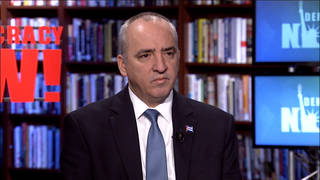
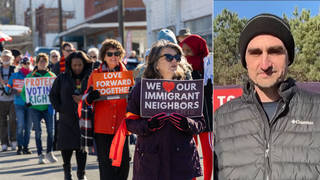
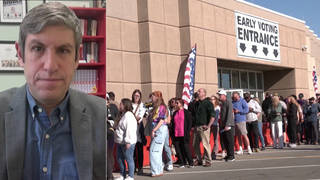
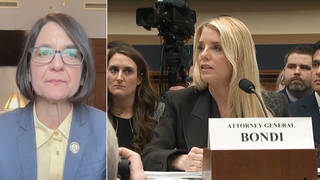







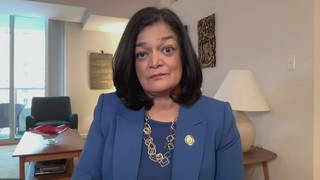
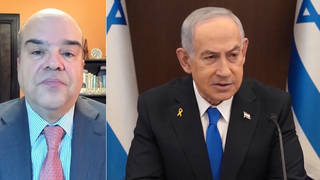
Media Options